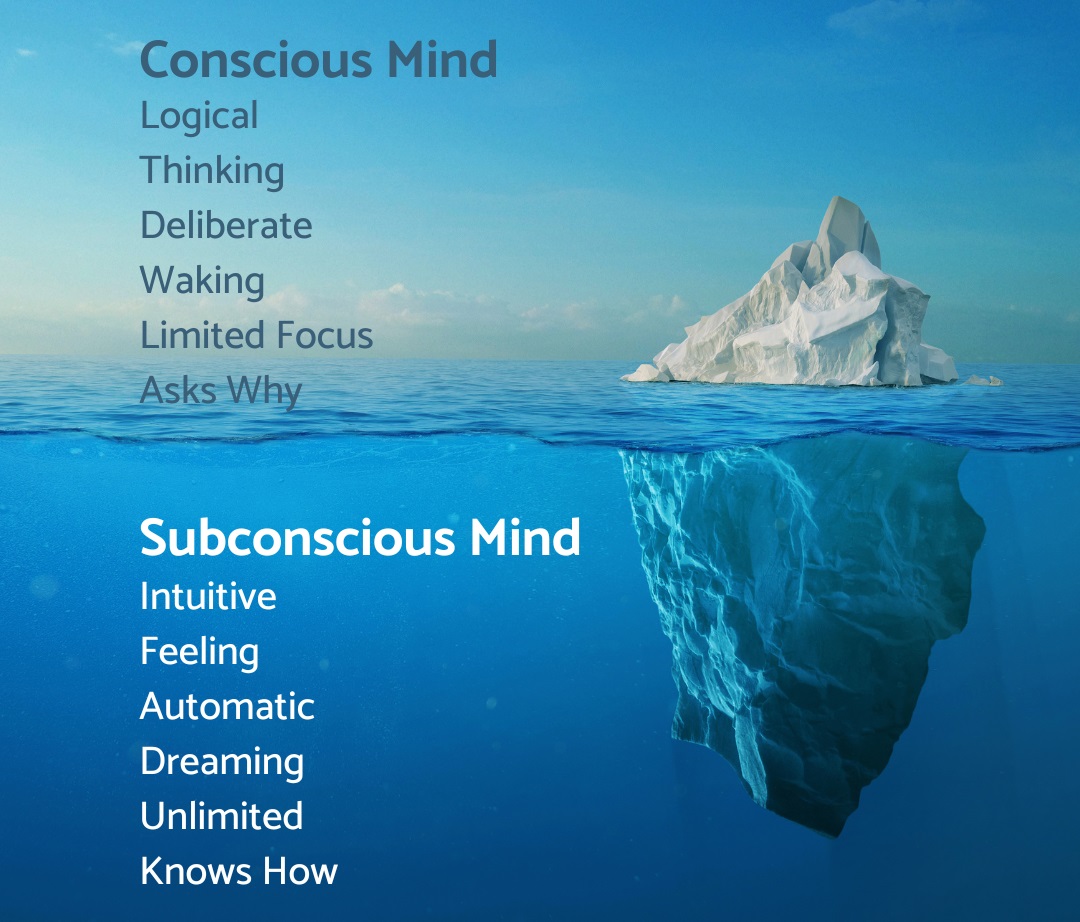
Understanding the Unconscious Mind
The human mind is a complex and multifaceted system that operates on both conscious and unconscious levels. While the conscious mind is responsible for our awareness, rational thought, and decision-making processes, the unconscious mind operates beneath the surface, influencing our thoughts, emotions, and behaviours in ways that we may not always be aware of.
What is the Unconscious Mind?
The unconscious mind refers to the vast reservoir of thoughts, memories, feelings, and impulses that exist beyond our conscious awareness. Unlike the conscious mind, which we can actively observe and control, the unconscious mind operates largely outside of our awareness, shaping our perceptions and guiding our actions without our conscious knowledge.
Key Concepts:
- Instinctual Drives: At the core of the unconscious mind are instinctual drives that govern our basic survival and reproductive instincts. These primal drives, such as hunger, thirst, and sexual desire, are deeply rooted in our evolutionary history and exert a powerful influence on our behaviour.
- Implicit Memories: Implicit memories are memories that are stored and processed at an unconscious level, often without our conscious awareness. These memories can be formed through repeated experiences, conditioning, and emotional associations, and they shape our perceptions and responses to the world around us.
- Emotional Processing: The unconscious mind plays a central role in processing and regulating our emotions. It serves as a repository for our deepest fears, desires, and unresolved conflicts, influencing our emotional reactions and behaviours in subtle yet profound ways.
- Cognitive Biases: Our unconscious mind is also responsible for the formation of cognitive biases, or systematic patterns of thinking that can distort our perceptions and judgments. These biases, which often operate outside of our conscious awareness, can influence how we interpret information, make decisions, and interact with others.
Differences from the Conscious Mind:
While the conscious mind is characterized by awareness, rationality, and logical reasoning, the unconscious mind operates on a deeper, more instinctual level. Unlike the conscious mind, which is limited in its capacity and processing speed, the unconscious mind is vast, fast, and capable of processing vast amounts of information simultaneously.
In summary, the unconscious mind is a powerful force that shapes our thoughts, emotions, and behaviours in ways that are often beyond our conscious control. By understanding the key concepts and functions of the unconscious mind, we can gain insight into our own motivations, behaviours, and inner workings, ultimately leading to greater self-awareness and personal growth.
The Unconscious Mind in Early Childhood
During early childhood, the unconscious mind is particularly active and influential, playing a crucial role in shaping children’s perceptions, emotions, and behaviours. This developmental period is marked by rapid cognitive, emotional, and social growth, during which children rely heavily on their senses, emotions, and instincts to navigate the world around them.
Active and Influential Role:
The unconscious mind is highly active and influential during early childhood due to the rapid development of neural pathways and brain structures that govern cognitive and emotional processing. As children explore their environment, engage in social interactions, and experience new sensations, their unconscious mind absorbs and integrates vast amounts of information, shaping their perceptions and responses to the world.
Reliance on Senses, Emotions, and Instincts:
Young children rely on their senses, emotions, and instincts to make sense of their surroundings and interact with others. Their perceptions are largely driven by sensory input, emotional cues, and instinctual responses, rather than rational thought or logical reasoning. This reliance on sensory and emotional processing allows children to explore, learn, and engage with the world in a holistic and intuitive manner.
Shaping Unconscious Beliefs, Attitudes, and Behaviors:
Experiences and interactions during early childhood play a critical role in shaping children’s unconscious beliefs, attitudes, and behaviours. Positive experiences, such as nurturing relationships, supportive environments, and enriching activities, can foster a sense of security, trust, and self-confidence, laying the foundation for healthy unconscious development.
Conversely, negative experiences, such as trauma, neglect, or exposure to stress, can imprint negative beliefs, fears, and insecurities on the unconscious mind, leading to emotional and behavioural challenges later in life. Early childhood experiences can shape unconscious patterns of thought and behaviour that persist into adulthood, influencing relationships, decision-making, and overall well-being.
In summary, the unconscious mind is highly active and influential during early childhood, shaping children’s perceptions, emotions, and behaviours in profound ways. By understanding the role of the unconscious mind in early childhood development, parents, caregivers, and educators can create supportive environments and experiences that nurture healthy growth and resilience in young children.
Influences on Behaviour and Emotions
Understanding how the unconscious mind influences children’s behaviour and emotions is essential for supporting their healthy development and well-being. During early childhood, the unconscious mind plays a significant role in shaping children’s responses to stimuli, forming patterns of thought and behaviour, and developing coping strategies to navigate their environment.
Influence of the Unconscious Mind:
The unconscious mind exerts a powerful influence on children’s behaviour, emotions, and responses to stimuli, often operating beneath the surface of conscious awareness. Children’s actions and reactions are shaped by a complex interplay of internal drives, emotions, and external factors, all of which are filtered through the lens of the unconscious mind.
Impact of Early Experiences and Family Dynamics:
Early experiences and family dynamics play a crucial role in shaping unconscious patterns of thought and behaviour in young children. Positive experiences, such as secure attachment, nurturing relationships, and consistent caregiving, can foster a sense of safety, trust, and emotional regulation, leading to healthy unconscious development.
Conversely, adverse experiences, such as trauma, neglect, or exposure to conflict, can imprint negative beliefs, fears, and coping mechanisms on the unconscious mind. Children may develop unconscious defence mechanisms, such as avoidance, denial, or dissociation, as a way to cope with overwhelming emotions or threats to their safety and well-being.
Cultural Influences and Socialization:
Cultural influences and socialization also play a significant role in shaping unconscious patterns of thought and behaviour in young children. Cultural norms, beliefs, and values are internalized at an unconscious level through social interactions, family dynamics, and exposure to media and societal messages.
Children learn societal expectations, gender roles, and cultural norms through observation, imitation, and reinforcement, often without conscious awareness. These unconscious beliefs and attitudes can influence children’s behaviour, emotions, and self-perceptions, shaping their identity and sense of belonging within their cultural context.
Unconscious Defense Mechanisms and Coping Strategies:
Young children may employ unconscious defence mechanisms and coping strategies to manage overwhelming emotions, navigate social situations, and protect themselves from perceived threats. Common defence mechanisms observed in young children include:
- Projection: attributing one’s own feelings or impulses to others
- Regression: reverting to earlier, more immature behaviours
- Displacement: redirecting uncomfortable feelings onto a less threatening target
- Repression: pushing painful memories or emotions into the unconscious mind
Exploring these unconscious defence mechanisms and coping strategies can provide insight into children’s emotional and behavioural responses to stress, conflict, and adversity, and inform strategies for supporting their emotional well-being and resilience.
In summary, the unconscious mind plays a central role in shaping children’s behaviour, emotions, and responses to stimuli during early childhood. By understanding the influence of the unconscious mind and its impact on children’s development, parents, caregivers, and educators can create supportive environments and relationships that nurture healthy growth and resilience in young children.
Learning and Development
Understanding the role of the unconscious mind in children’s learning processes and cognitive development is crucial for creating effective educational strategies and supporting their overall growth and learning potential. During early childhood, the unconscious mind plays a significant role in how children absorb information, develop language skills, socialize with others, and solve problems.
Role of the Unconscious Mind in Learning:
The unconscious mind plays a fundamental role in children’s learning processes, influencing how they perceive, process, and retain information. While conscious learning involves deliberate attention and effort, much of children’s learning occurs at an unconscious level, driven by instinctual drives, emotional responses, and implicit learning mechanisms.
Absorption of Information and Language Development:
Children absorb information from their environment at an unconscious level, often through observation, imitation, and immersion in their surroundings. Language development, for example, occurs largely through unconscious processes, as children internalize the sounds, words, and grammar of their native language through exposure and interaction with caregivers and peers.
The unconscious mind plays a vital role in shaping children’s language skills, influencing their ability to understand and produce language, as well as their vocabulary acquisition, grammar comprehension, and verbal fluency.
Social Skills and Problem-Solving Abilities:
Socialization and problem-solving abilities also rely heavily on unconscious processes during early childhood. Children learn social norms, communication strategies, and conflict resolution skills through observation, experimentation, and social interactions with others.
The unconscious mind facilitates the development of social skills by processing emotional cues, interpreting social cues, and generating appropriate responses in social situations. Similarly, problem-solving abilities are enhanced by unconscious processes such as pattern recognition, creativity, and insight, which contribute to children’s ability to generate solutions and adapt to new challenges.
Role of Play and Imagination:
Play and imagination are essential components of early childhood development, fostering creativity, exploration, and unconscious learning. Through play, children engage in symbolic representation, role-playing, and fantasy scenarios that allow them to explore and make sense of their experiences, emotions, and relationships.
The unconscious mind is highly active during play, facilitating the integration of new information, the practice of social skills, and the development of problem-solving abilities in a safe and supportive environment. Imaginative play also promotes emotional expression, empathy, and perspective-taking, enhancing children’s social and emotional development.
In summary, the unconscious mind plays a vital role in children’s learning and development during early childhood, influencing how they absorb information, develop language skills, socialize with others, and solve problems. By understanding the role of the unconscious mind in learning, educators, caregivers, and parents can create enriching environments and experiences that support children’s cognitive, social, and emotional growth.
Practical Tips for Supporting Healthy Development
Supporting healthy unconscious development in young children requires a holistic approach that addresses their cognitive, emotional, and social needs. Parents, caregivers, and educators play a crucial role in creating supportive environments and fostering positive interactions that promote healthy growth and well-being.
Strategies for Parents, Caregivers, and Educators:
- Foster a Secure Attachment: Build trusting and nurturing relationships with young children to promote a secure attachment bond. Respond promptly to their needs, provide comfort and reassurance, and engage in warm and affectionate interactions.
- Encourage Exploration and Discovery: Create opportunities for children to explore their environment, engage in hands-on activities, and pursue their interests. Encourage curiosity, creativity, and independent exploration to foster a love of learning and discovery.
- Provide Emotional Support: Validate children’s feelings and emotions, and help them develop emotional regulation skills. Teach coping strategies such as deep breathing, mindfulness, and positive self-talk to manage stress and anxiety.
- Establish Predictable Routines: Create consistent daily routines and rituals that provide structure and stability for young children. Predictable routines help children feel safe and secure, reduce anxiety, and promote a sense of autonomy and independence.
Creating Supportive Environments:
- Cultivate a Nurturing Atmosphere: Create a warm, welcoming, and nurturing environment that promotes emotional well-being and a sense of belonging. Use soft lighting, comfortable furnishings, and calming colours to create a peaceful and inviting space.
- Provide Age-Appropriate Materials: Offer a variety of age-appropriate toys, books, and materials that stimulate creativity, imagination, and exploration. Encourage open-ended play and hands-on learning experiences that engage children’s senses and spark their curiosity.
- Foster Nature Connection: Incorporate nature into the environment through outdoor play spaces, nature walks, and gardening activities. Nature has a calming effect on children’s nervous systems, promotes physical activity, and encourages a sense of wonder and awe.
- Create Safe Spaces for Expression: Provide opportunities for children to express themselves through art, music, movement, and storytelling. Create safe spaces where children can freely express their thoughts, feelings, and ideas without judgment or criticism.
Promoting Positive Interactions and Relationships:
- Model Positive Behavior: Be a positive role model for children by demonstrating kindness, empathy, and respect in your interactions with others. Model healthy communication, problem-solving, and conflict resolution skills.
- Encourage Collaboration and Cooperation: Foster a sense of teamwork and cooperation among children by promoting collaborative activities, group projects, and shared responsibilities. Encourage children to work together, share ideas, and support each other’s learning and growth.
- Cultivate Empathy and Understanding: Teach children to empathize with others and understand different perspectives. Encourage kindness, compassion, and empathy towards peers, siblings, and members of the community.
- Build Strong Connections: Foster strong connections and relationships among children, caregivers, and educators. Encourage positive interactions, mutual respect, and a sense of belonging within the community.
By implementing these practical tips and strategies, parents, caregivers, and educators can create supportive environments and relationships that nurture healthy development, foster emotional well-being, and promote positive interactions and relationships among young children.
Conclusion
In this blog post, we’ve explored the critical role of the unconscious mind in early childhood development and discussed practical strategies for supporting healthy growth and well-being in young children. Here, we recap key points and emphasize the importance of understanding and nurturing the unconscious mind during this formative period.
- The unconscious mind plays a significant role in shaping children’s behaviour, emotions, and cognitive development during early childhood.
- Early experiences, family dynamics, and cultural influences shape unconscious patterns of thought and behaviour, impacting children’s learning, socialization, and emotional well-being.
- Practical tips and strategies for parents, caregivers, and educators include fostering secure attachments, providing emotional support, creating supportive environments, and promoting positive interactions and relationships.
Understanding and nurturing the unconscious mind in early childhood development is crucial for laying the foundation for healthy growth and well-being. By creating supportive environments, fostering positive relationships, and providing opportunities for exploration and expression, we can help children develop the skills, resilience, and self-awareness needed to thrive in today’s complex world.
As parents, caregivers, educators, and members of the community, we have a responsibility to support the healthy development of young children. By applying the insights and strategies discussed in this blog post, we can create environments that nurture emotional well-being, curiosity, and creativity in young children. Let us work together to cultivate a culture of understanding, empathy, and support for the next generation, ensuring that every child has the opportunity to reach their full potential.
In closing, let us commit to fostering healthy development and nurturing the unconscious mind in young children, recognizing that our efforts today will shape the future of tomorrow. Together, we can make a positive difference in the lives of children and create a brighter, more compassionate world for generations to come.


 Title
Title  Date
Date Category
Category